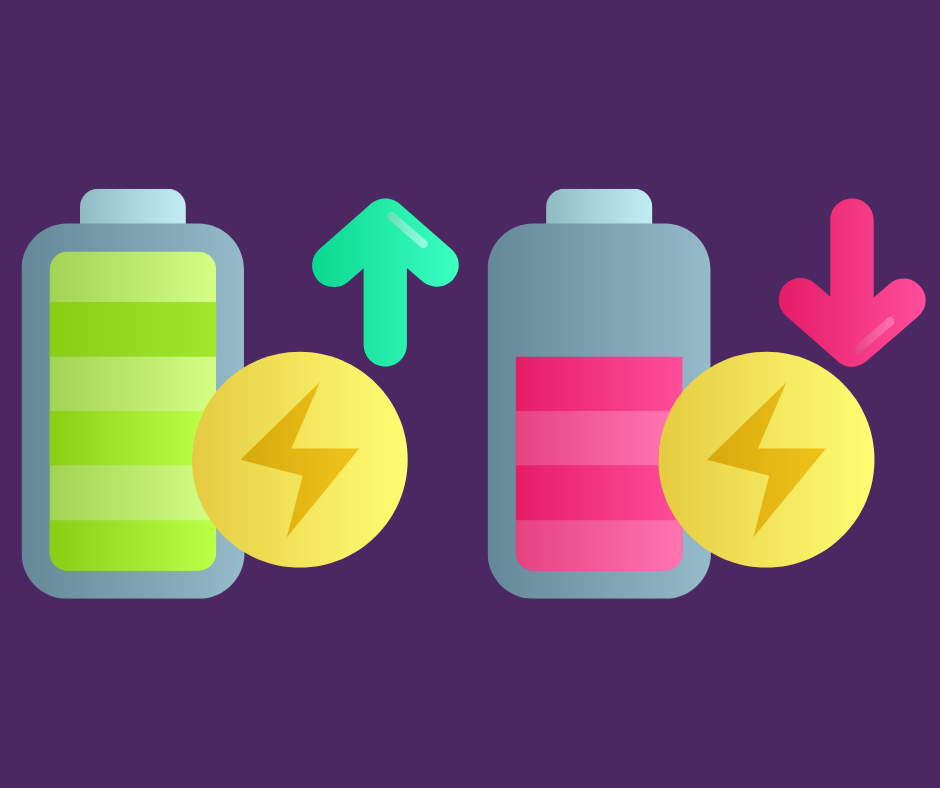Energy Accounting
- Spectrum Gaming
- Jun 29, 2024
- 3 min read
Research shows that autistic people's brains tend to have higher processing power than non-autistic brains, but this may not always show as we often have a lot more to process compared to others. As a result, it can be quite easy for us to run out of ‘mental energy’ during the day. A lot of autistic people have had to learn how to manage their mental energy, to do all the activities they need to/ want to do during the day, and this is called energy accounting.
To understand this, think of an autistic person’s energy levels like a battery. Throughout the day, we experience things that ‘drain’ our battery.
Battery drainers might be
Each individual is different and has different things that drain their battery. Some things that are drainers for one person, might charge energy for another.
One person’s drainers may be:
Small amount
Being asked how your day was
Brushing your teeth
Getting dressed
Medium amount
Cooking a meal
Having a shower or bath
Being in a noisy environment
Being in a bright environment
Large amount
Lack of sleep
School
Hot day
Pain
Medical appointment
Reaching out to a friend
Housework
They may also be things that recharge our batteries. Time spent with a special interest, or listening to music for example. Spending time doing these things can restore your energy levels.
Battery chargers might be
(but if your energy level is too low, you may not be able to do some of these things)
Again, things that may charge energy for one person, may be drainers for another. Each activity will also take or charge different amounts of energy depending on the person.
One person’s battery chargers might be:
Walking
Reading
Painting
Gaming
Solitude
Wearing noise cancelling headphones
Running
Listening to music
Time with a special interest
Self Care
Accomplishing a small task
Cooking & eating a proper meal- this depends on the person, for some it’s methodical/ beneficial and others it drains the battery
Cancelling plans, prioritising yourself and only doing what is achievable

Managing your energy
When energy levels get too low, meltdowns are more likely to happen as you are more stressed and have little emotional energy left to manage any further demands/ sensory input/ stressors.
When an activity or several activities drain your battery, time needs to be put aside to recharge it to prevent their battery draining completely. Being consistently low on energy over a long period of time results in autistic burnout, so having recovery times and activities is essential.
People also start each day with a different amount of battery, so may be able to do more on certain days compared to others. Battery level can be affected by things such as amount of sleep, how much you were able to recharge the night before and amount of worries.
This looks different for everyone and activities can take or recharge a different amount of energy, depending on the person.
Autistic people have limited energy they can use every day. The amount of energy also varies day by day. This means that as time goes on it can be more difficult to complete tasks. As energy changes day by day, it may be really hard to do certain things that you find easy to do on other days.
We need to prioritise energy on most important things and recharge often. If we fail to recharge in time or if we do something that takes an enormous toll, we might CRASH. It’s like having a flat mobile phone, there is nothing we can do until we have recharged, no matter how much we want or need to.
Being able to listen to music or noise cancelling headphones can help you get through a task without draining your battery too fast. Like using your phone but it’s plugged into the charger so input and output are the same. Being able to control your environment, priority of the task and how you complete it can improve battery life.
"When I was at school, it took all of my energy to try and fit in, which meant I had nothing left when I got home. If my mum asked me how my day was, I couldn't answer and it could make me have a huge meltdown. This wasn't her fault, it was because I didn't have any energy left. I also never had meltdowns at school, I kept them inside until I got home because home is my safe place" - Autistic adult
